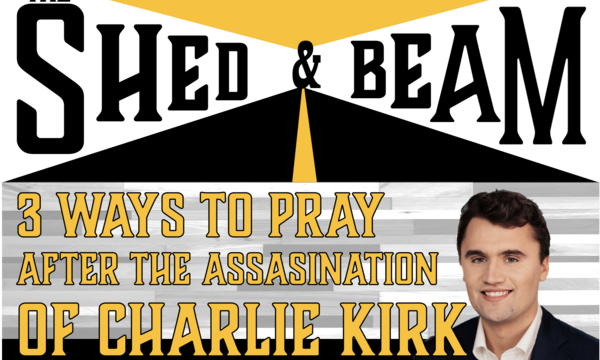Recently I was in discussion with a friend who was concerned about the tendency of some Christians to spiritualize death and dying by appeal to the afterlife. To “spiritualize” death and dying is to utilize spiritual beliefs to avoid dealing with unwanted feelings over the loss of a loved one. “I just try to think of how happy she is with Jesus.” “When we see him again in heaven it will seem like no time has passed.” “I am just glad she’s finally at rest in Jesus’ arms.” To spiritualize death and dying in these and other ways is a defense mechanism. It is a way to defend against experiencing some painful part of reality as it actually is.
It is important to understand that to use such sentiments and the theological beliefs that undergird them as spiritualizations does not mean these sorts of sentiments are untrue. They may or may not be true. That a belief is susceptible to spiritualization has nothing to do with the truth or falsity of the belief. Spiritualizing loss has to do with how one uses the belief and not in the truth or falsity of the belief.
For instance, getting perspective on things can also be utilized as a defense mechanism (it’s called intellectualization). As an example, I could get diagnosed with terminal cancer and avoid grieving my shortened lifespan as follows: “Well, I could have died much younger. At least I’ve had forty-seven years of life.” That perspective-gaining statement is true. What makes it problematic is if I am using that truth to avoid the sadness and pain of the reality that I am going to die sooner than I (and my loved ones) had thought. To use it that way would be to intellectualize death and dying. There is nothing wrong with getting a true perspective on things if one is not using that perspective as a way to avoid unwanted feelings. The non-defensive move would be to be able to authentically say: “I am really, really sad that I am going to die sooner than I thought and I am really, really grateful for the forty-seven years I’ve had.”
In the same way, it may be true that my deceased grandmother is at rest in Jesus’ arms. The psychologically problematic move is to use that truth to distance myself from the sadness I feel in the wake of losing my grandmother. The way to deal with the tendency of some Christians to spiritualize death and dying is not to convince them that their beliefs about the soul or afterlife are false, but to help them hold the good and the bad together: “I am joyful that grandma is at peace with Jesus and I am devastated that she is gone.” It is both. We need to emphasize that while we do not grieve as those who have no hope, we do grieve (1 Thess. 4:13). We grieve and we hope.
This is where dualism and non-reductive physicalism come in. Some have suggested that one of the practical problems with dualism—the view that human persons are composed of an immaterial soul and physical body—is that it opens the door for Christians to spiritualize death and dying. The idea is that if one believes that persons have an immaterial soul that continues to exist in the presence of God after the death of the body, then one can focus one’s attention on the joy of the on-going heavenly life rather than on the pain of the loss of physical, earthly life. No doubt dualist beliefs have been used in such a way. But that dualism provides theoretical space for spiritualization says nothing about the truth or falsity of dualism. Once again, getting perspective on things is also a way that persons can defend against pain in the present, but simply because getting perspective on things can be used to defend against pain says nothing about the truth or falsity of getting perspective on things.
Indeed, dualism’s recent competitor—non-reductive physicalism—can also be used by the Christian to spiritualize death and dying. For instance, the Christian non-reductive physicalist either believes in immediate physical resurrection after death (e.g., ) or physical reconstitution of the person at some future point in time (e.g., ). Either view can be used by persons to avoid painful emotions about the deceased. Immediate resurrection is in some ways an even more convenient afterlife story for the denial of death for upon physical death the deceased person immediately exists as a physical, embodied person with God. The idea of the physical reconstitution of the deceased person at a future point in time is perhaps less obviously comforting here and now, but it can still be used to deny the pain of death in the present. “How are you feeling about the loss of your grandmother?” “I try not to think about it,” the Christian non-reductive physicalist says. “Instead, I focus on the idea that God keeps grandma in mind and I know I will see her again perfectly restored at the general resurrection.” As long as someone stays in that mindset as a means to avoid feeling the pain of their loss, then they are using that non-dualistic afterlife belief as a way to spiritualize death and dying.
The moral of this story is that Christian anthropologies are equal-opportunity employers when it comes to offering resources to avoid unwanted feelings surrounding death. On the Christian scheme, spiritualization of death and dying is possible not due to one’s metaphysics of the person but due to one’s belief in bodily resurrection. Whether there is an intermediate state of disembodied existence prior to the resurrection, an immediate bodily resurrection, or a future bodily reconstitution is really beside the point when it comes to spiritualization. Any of those afterlife paradigms can be used to deny the bad of the present reality and focus on the good of some anticipated reality.
So, nothing wrong with arguing for your preferred view of theological anthropology and the resultant picture of the afterlife, but we should not make the mistake of thinking that the tendency of some Christians to deny the pain of death by focusing on the on-going existence of the soul has anything to do with the truth or falsity of dualism. Spiritualization has to do with psychology, not ontology. On any of these anthropologies, the earthly existence of the person has ceased and that is a painful and tragic loss. And on any of these views, there is the hope of continued existence in a completely restored state. So, on any of these views, we need to help Christians integrate the good and the bad upon the death of a loved one and leave their ontology of the person and their view of the afterlife to the side.
 51ÂÜŔň
51ÂÜŔň
.jpg)


.jpg)